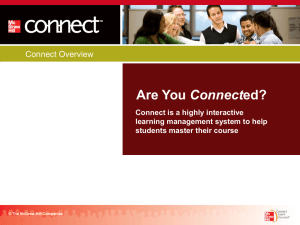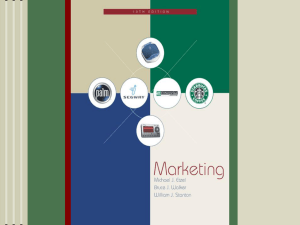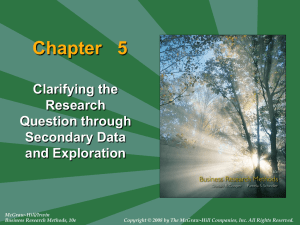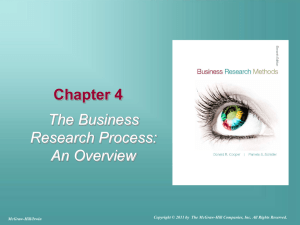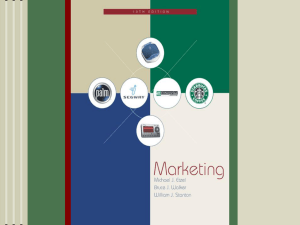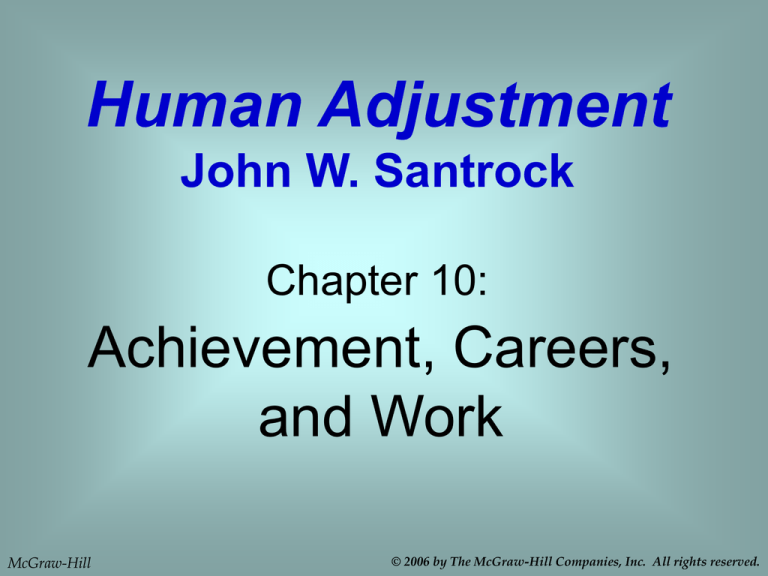
Human Adjustment
John W. Santrock
Chapter 10:
Achievement, Careers,
and Work
McGraw-Hill
© 2006 by The McGraw-Hill Companies, Inc. All rights reserved.
10-2
Chapter Outline
Achievement
Careers and Jobs
Work
McGraw-Hill
©2006 by the McGraw-Hill Companies, Inc. All rights reserved.
10-3
Learning Goals
1. Discuss achievement and related adjustment
strategies
2. Describe important aspects of careers and jobs
3. Summarize key aspects of work
McGraw-Hill
©2006 by the McGraw-Hill Companies, Inc. All rights reserved.
10-4
ACHIEVEMENT
Intrinsic and Extrinsic Reinforcement
Goal Setting, Planning, and Monitoring
Time Management
Some Obstacles to Achievement
McGraw-Hill
©2006 by the McGraw-Hill Companies, Inc. All rights reserved.
10-5
Intrinsic and Extrinsic Reinforcement
Extrinsic motivation - involves external incentives
such as rewards and punishments
Intrinsic motivation - based on internal factors such
as self-determination, curiosity, challenge, and effort
– Intrinsic motivation is more likely to produce competent
behavior and mastery
– Intrinsic motivation is the key to achievement
McGraw-Hill
©2006 by the McGraw-Hill Companies, Inc. All rights reserved.
10-6
Goal Setting, Planning, and Monitoring
Achievement improves when people set goals that are
specific, short-term and challenging
High-achieving individuals monitor themselves
(systematically evaluate progress toward goals)
McGraw-Hill
©2006 by the McGraw-Hill Companies, Inc. All rights reserved.
Adjustment Strategies
for Setting Goals
10-7
1. Set goals that are challenging, reasonable, and
specific
2. Set completion dates for your goals
3. Create sub-goals
4. Make a commitment
5. Monitor your progress
McGraw-Hill
©2006 by the McGraw-Hill Companies, Inc. All rights reserved.
10-8
Time Management
Steven Covey (1989) set up a time matrix:
– Important activities - those linked to your values and goals
– Urgent activities - those that require immediate attention
Not
McGraw-Hill
Urgent
Urgent
Important
Pay bill
today
Psych test in
2 weeks
Not
Important
Phone
ringing
Reading
newspaper
©2006 by the McGraw-Hill Companies, Inc. All rights reserved.
10-9
Time Management
Tips on time management:
– Spend time on important non-urgent activities
– Don’t let your life be ruled by urgency
– Do important activities early
– Set priorities for your tasks and complete them in that order
McGraw-Hill
©2006 by the McGraw-Hill Companies, Inc. All rights reserved.
10-10
Create and Monitor Time Plans
Determine the most important activities for each day
and allocate adequate time for them
Create a to-do list, which involves listing and setting
priorities for daily tasks
Monitor your progress on a yearly,
monthly, and daily basis
McGraw-Hill
©2006 by the McGraw-Hill Companies, Inc. All rights reserved.
10-11
Some Obstacles to Achievement
Achievement problems occur when you:
– don’t set goals
– don’t plan how to reach them
– don’t monitor your progress toward goals
– don’t manage your time effectively
– procrastinate
– insist on perfection
– try to protect self-worth by avoiding failure
McGraw-Hill
©2006 by the McGraw-Hill Companies, Inc. All rights reserved.
10-12
Procrastination
Reasons for procrastination include:
– difficulty concentrating
– fear and anxiety
– negative beliefs
– personal problems
– boredom
– unrealistic expectations
– perfectionism
– fear of failure
McGraw-Hill
©2006 by the McGraw-Hill Companies, Inc. All rights reserved.
Adjustment Strategies
for Conquering Procrastination
10-13
1. Acknowledge that procrastination is a problem
2. Identify your values and goals
3. Work on your time management
4. Divide the task into smaller parts
5. Use behavioral strategies
6. Use cognitive strategies
McGraw-Hill
©2006 by the McGraw-Hill Companies, Inc. All rights reserved.
10-14
Perfectionism
Perfectionists think mistakes are never acceptable
and the highest standards always have to be achieved
Perfectionists are vulnerable to:
– decreased productivity
– impaired health
– relationship problems
– low self-esteem
McGraw-Hill
©2006 by the McGraw-Hill Companies, Inc. All rights reserved.
Adjustment Strategies
for Coping with Perfectionism
10-15
1. Make a list of advantages and disadvantages of
trying to be perfect
2. Increase awareness of the self-critical nature of your
all-or-nothing thoughts
3. Be realistic about what you can do
4. Set strict time limits on each project
5. Learn how to deal with criticism
McGraw-Hill
©2006 by the McGraw-Hill Companies, Inc. All rights reserved.
10-16
Protecting Self-worth by Avoiding Failure
Ineffective ways people are distracted from goals:
– Nonperformance
– Sham effort
– Procrastination
– Setting unreachable goals
– The academic wooden leg
McGraw-Hill
©2006 by the McGraw-Hill Companies, Inc. All rights reserved.
10-17
Protecting Self-worth by Avoiding Failure
Efforts to avoid failure involve self-handicapping
strategies
Individuals handicap themselves by:
– Not making an effort
– Putting off a project until the last minute
If subsequent performance is poor, these
circumstances can be seen as the cause (rather than a
lack of ability)
McGraw-Hill
©2006 by the McGraw-Hill Companies, Inc. All rights reserved.
10-18
Protecting Self-worth by Avoiding Failure
Strategies to reduce preoccupation with protecting selfworth and avoiding failure:
– Set challenging but realistic goals
– Strengthen link between your effort and self-worth
– Take pride in your effort
– Have positive beliefs about your abilities
McGraw-Hill
©2006 by the McGraw-Hill Companies, Inc. All rights reserved.
10-19
Review - Learning Goal 1
– What motivates people to achieve?
– How are goals related to achievement?
– What are some important aspects of time management?
– What are some obstacles to achievement and ways to deal
with them?
McGraw-Hill
©2006 by the McGraw-Hill Companies, Inc. All rights reserved.
10-20
CAREERS AND JOBS
Career Development Across the Lifespan
Skills and Personality Traits
Knowledge, Goals, and Careers
Getting a Job
McGraw-Hill
©2006 by the McGraw-Hill Companies, Inc. All rights reserved.
10-21
Career Development Across the Lifespan
Eli Ginzberg (1972) proposed 3 career stages:
– Fantasy (birth-11) - careers perceived in unrealistic manner
– Tentative (11-17) - transition
– Realistic (18-25) - make pragmatic decisions
McGraw-Hill
©2006 by the McGraw-Hill Companies, Inc. All rights reserved.
10-22
Career Development Across the Lifespan
Donald Super (1976) described 5 career stages:
– Growth (birth-14) - physical and cognitive development
– Exploration (15-24) - take needs, interests, values into
consideration
– Establishment (25-44) - pursue permanent career
– Maintenance (45-64) - continue career
– Decline (65 on) - retirement
McGraw-Hill
©2006 by the McGraw-Hill Companies, Inc. All rights reserved.
10-23
Skills and Personality Traits
Basic Skills
– Reading
– Writing
– Mathematics
– Speaking
– Listening
Thinking Skills
– Creative thinking
– Decision-making
– Visualization
McGraw-Hill
Personal Qualities
– Self-esteem
– Self-management
– Responsibility
People Skills
– Social
– Negotiation
– Leadership
©2006 by the McGraw-Hill Companies, Inc. All rights reserved.
10-24
Holland’s Personality Type Theory
John Holland (1973) identified six career-related
personality styles:
– Realistic
– Investigative
– Artistic
– Social
– Enterprising
– Conventional
McGraw-Hill
©2006 by the McGraw-Hill Companies, Inc. All rights reserved.
Holland’s Model of Personality Types
and Career Choices
10-25
Realistic Doing / Things
Conventional -
Investigative -
Conforming / Data
Enterprising -
Thinking / Ideas
Artistic -
Managing / People
Creating / Ideas,
Things
Social Helping / People
McGraw-Hill
©2006 by the McGraw-Hill Companies, Inc. All rights reserved.
10-26
Knowledge, Goals, and Careers
Two important aspects of exploring careers are:
– becoming knowledgeable about careers
– setting career goals
McGraw-Hill
©2006 by the McGraw-Hill Companies, Inc. All rights reserved.
10-27
Getting a Job
Getting a job:
– Be aware of what employers want
– Do a thorough job search
– Create a résumé
– Learn how to have a great job interview
McGraw-Hill
©2006 by the McGraw-Hill Companies, Inc. All rights reserved.
10-28
Figure 10.8 Desired Skills of an Ideal Job
Candidate Rated by Employers
McGraw-Hill
©2006 by the McGraw-Hill Companies, Inc. All rights reserved.
10-29
Adjustment Strategies
for “Knocking ’Em Dead” in a Job Interview
1. Create an excellent résumé
2. Don’t wing an interview
3. Be prepared to give examples of work experiences
4. Anticipate possible questions for the interview
5. Ask appropriate job-related questions yourself
6. Keep your cool
7. As the interview closes, decide whether you want
the job
8. After the interview, write a follow-up letter
McGraw-Hill
©2006 by the McGraw-Hill Companies, Inc. All rights reserved.
10-30
Review - Learning Goal 2
– How do our thoughts about careers typically develop
through the lifespan?
– How do our skills and traits influence our careers?
– What are key factors involved in obtaining a good job?
McGraw-Hill
©2006 by the McGraw-Hill Companies, Inc. All rights reserved.
10-31
WORK
The Role of Work in People’s Lives
Work During College
Work and Retirement
Leisure
McGraw-Hill
©2006 by the McGraw-Hill Companies, Inc. All rights reserved.
10-32
The Role of Work in People’s Lives
Work defines people in fundamental ways:
– their financial standing
– housing
– the way they spend their time (one-third of their lives)
– where they live
– their friendships
– their health
– for some people, their identity
McGraw-Hill
©2006 by the McGraw-Hill Companies, Inc. All rights reserved.
10-33
Workaholics
Workaholics:
– seem addicted to work
– may enjoy work
– identify strongly with their careers
McGraw-Hill
©2006 by the McGraw-Hill Companies, Inc. All rights reserved.
10-34
Dual-career Couples
The two-earner couple has increased in prevalence
– Women are taking increased responsibility for family income
– Men are showing greater interest in families and parenting
McGraw-Hill
©2006 by the McGraw-Hill Companies, Inc. All rights reserved.
10-35
Diversity in the Workplace
The workplace is becoming increasingly diverse
– Gender diversity increasingly characterizes occupations
– Ethnic diversity is increasing in every developed country
except France
– Latinos are projected to constitute a larger percentage of
the U.S. labor force than African Americans by 2012
McGraw-Hill
©2006 by the McGraw-Hill Companies, Inc. All rights reserved.
10-36
Diversity in the Workplace
Glass ceiling = invisible barrier to career advancement
that prevents women and ethnic minorities from holding
managerial or executive jobs regardless of their
accomplishments and merits
McGraw-Hill
©2006 by the McGraw-Hill Companies, Inc. All rights reserved.
10-37
Unemployment
Unemployment produces stress
Unemployment is related to:
– physical problems
– mental problems
– marital and family problems
– homicide
– other crimes
McGraw-Hill
©2006 by the McGraw-Hill Companies, Inc. All rights reserved.
10-38
Working During College
During the 1999-2000 academic year, 80% of
undergraduate students worked
As number of hours worked per week increased,
grades declined
Jobs can contribute to education, in the form of
cooperative programs or internships
McGraw-Hill
©2006 by the McGraw-Hill Companies, Inc. All rights reserved.
10-39
Work and Retirement
Federal law prohibits employers from firing older
workers (who have seniority and higher salaries) just to
save money
McGraw-Hill
©2006 by the McGraw-Hill Companies, Inc. All rights reserved.
10-40
Retiring Part-time
Many retirees only partially retire, moving to part-time
employment
Reasons for continuing to work:
– part-time work for interest or enjoyment
– income
– desire to start a business
– desire to try a different field of work
– benefits
McGraw-Hill
©2006 by the McGraw-Hill Companies, Inc. All rights reserved.
10-41
Adjusting to Retirement
Older adults who adjust best to retirement:
– are healthy
– have adequate income
– are active
– are better educated
– have an extended social network
– were satisfied with their lives before retirement
McGraw-Hill
©2006 by the McGraw-Hill Companies, Inc. All rights reserved.
10-42
Leisure
Leisure = the pleasant times after work when individuals
are free to pursue activities and interests of their own
choosing such as hobbies, sports, or reading
Men who went on annual vacations were 32% less
likely to die of coronary heart disease
McGraw-Hill
©2006 by the McGraw-Hill Companies, Inc. All rights reserved.
10-43
Review - Learning Goal 3
– What role does work play in people’s lives?
– What are the things to know about working while going to
college?
– What characteristics work in retirement for older adults?
– What is leisure and what role does it play in people’s lives?
McGraw-Hill
©2006 by the McGraw-Hill Companies, Inc. All rights reserved.



